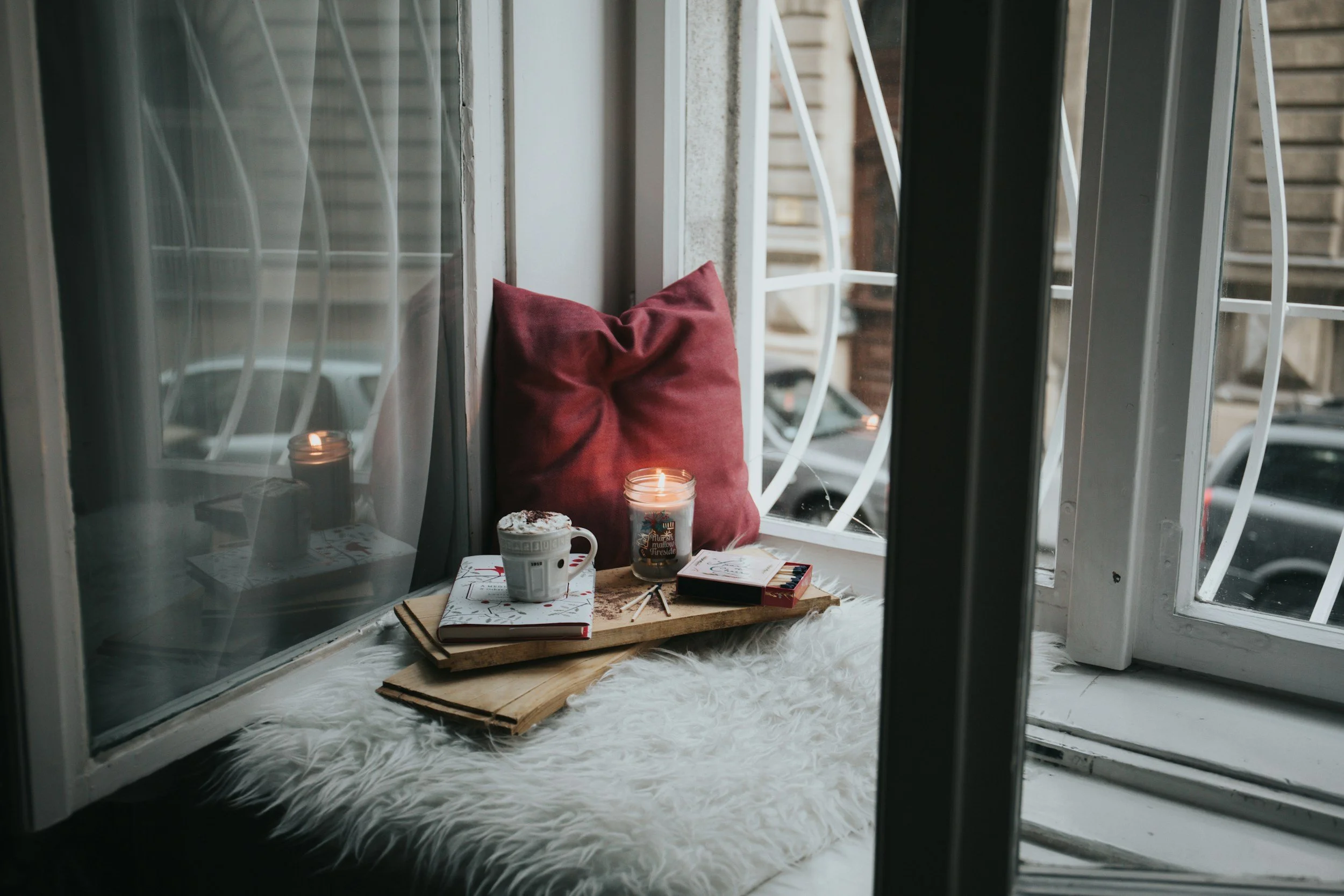
Anxiety and Panic
Finding Your Way Back to Calm
Navigating the waves of anxiety with steadiness and confidence
Anxiety speaks in whispers before it roars. Maybe yours began as a flutter of unease before presentations, or restless nights when your mind wouldn't quiet. Perhaps it arrived suddenly, uninvited, during what should have been an ordinary moment. However anxiety entered your life, you're not alone in feeling like it's taken up more space than you'd like.
The truth is, anxiety serves an important purpose—it's your nervous system's way of keeping you safe and alert. But when anxiety becomes a constant companion rather than an occasional guide, when it starts making decisions for you instead of with you, it may be time to reclaim your sense of calm.
Understanding Anxiety: More Than Just Worry
Anxiety isn't simply excessive worry or nervousness that you should be able to control. It's your body's natural alarm system working overtime, often responding to perceived threats that may not actually be dangerous in the present moment.
Here's what's important to remember: experiencing anxiety doesn't automatically mean you have an anxiety disorder. It's a normal, even necessary part of being human. Our ancestors depended on this very response to navigate genuine threats, and today, a healthy dose of anxiety still helps us prepare for important events and stay motivated. When it becomes overwhelming, though, support is both available and effective.
Ready to Talk?
Our Approach
How We Can Help You Find Calm
At The Authentic Life, we understand that anxiety is more than excessive worry—it's a complex interplay of thoughts, emotions, and physical sensations that can impact every aspect of your life. We offer a comprehensive, personalized approach because what works for one person may not work for another.
We work with your whole system, not just your thoughts, because anxiety lives in your mind, body, and nervous system. Our goal isn't just symptom reduction—it's helping you build resilience, self-compassion, and a different relationship with uncertainty where you no longer need to control everything.
Taking the First Step
We know that reaching out for help can feel daunting, especially when anxiety whispers that you should handle this alone or that seeking help means you're weak. The opposite is true—recognizing when you need support requires tremendous courage and self-awareness.
Common concerns about starting therapy include wondering if it might make anxiety worse, feeling like you should handle this yourself, or worrying that you can't explain how you feel. These concerns are normal and part of anxiety itself. We understand this and create a safe, supportive environment from the very first contact.
We offer a free 15-minute consultation where you can ask questions, share concerns, and explore whether we might be a good fit—with no pressure or commitment. You don't need to be "ready" to start therapy, your anxiety doesn't have to be "bad enough" to deserve help, and you don't need perfect words to describe your experience.
When Your Mind Becomes the Critic
One of anxiety's most challenging aspects is how it can turn your own thoughts against you. This inner critic becomes relentlessly harsh, offering a steady commentary that undermines your confidence:
• "I'm not handling this as well as everyone else"
• "Something terrible is going to happen"
• "Everyone can see how anxious I am"
• "I can't handle what's coming"
The exhausting part isn't just the anxiety itself—it's the secondary layer of anxiety about being anxious, the worry about your worry. This creates a vicious cycle where anxious thoughts fuel more anxiety, which feeds harsher self-criticism, which increases anxiety levels further.
What's crucial to understand is that these thoughts aren't revelations about your character or prophecies about your future. They're symptoms—manifestations of an overactive threat-detection system that's trying to protect you but has lost its calibration.
How Anxiety Shows Up in Daily Life
Anxiety doesn't always announce itself with panic attacks or obvious symptoms. Often, it weaves itself seamlessly into everyday experiences, becoming the quiet undercurrent that affects everything.
At work or school, anxiety often appears as perfectionism that prevents completion, procrastination driven by fear of judgment, or physical symptoms during meetings and presentations.
In relationships, it may show up as constantly seeking reassurance, overthinking every interaction afterward, or avoiding vulnerability to prevent potential rejection. For young people today, anxiety carries additional weight as they navigate climate uncertainty, economic instability, social media comparison, and pressure to have life figured out earlier than previous generations.
At home, you might find yourself lying awake with your mind spinning through worst-case scenarios, constantly checking and rechecking things like locks or emails, or feeling responsible for everyone else's emotional well-being.
When Worry Becomes Too Much: Recognizing the Signs
Anxiety becomes problematic when it starts limiting your choices and experiences. You might notice persistent worry that feels impossible to control, physical tension that doesn't seem to release, or sleep difficulties that leave you feeling unrested. Concentration problems can affect work and daily tasks, while irritability about things that wouldn't normally bother you becomes more frequent.
Panic attacks, when they occur, can involve:
• Rapid heartbeat or heart palpitations
• Shortness of breath or feeling like you can't breathe
• Sweating, trembling, or chest tightness
• Dizziness and fear of losing control or dying
These episodes are terrifying but not dangerous, though they often create a fear of future attacks that can be equally limiting. If you're experiencing these symptoms regularly, it's important to know that help is available and effective.
Ready to talk?
Common Types of Anxiety: Understanding the Landscape
While everyone's experience is unique, understanding common patterns can help normalize what you're going through.
-
Generalized Anxiety involves persistent worry that jumps from topic to topic—health, relationships, work, finances—creating a constant undercurrent of unease that's difficult to turn off.
-
Social Anxiety goes beyond introversion or shyness, involving intense fear of judgment in social situations that can make everyday interactions feel overwhelming.
-
Specific Phobias create intense, seemingly irrational fears of particular situations or objects, while Panic Disorder involves recurring panic attacks and persistent fear of future episodes.
-
Obsessive-Compulsive presentations involve intrusive thoughts and repetitive behaviors designed to reduce anxiety, though they often increase it over time.
Remember, you don't need to fit neatly into any category to deserve support. Anxiety exists on a spectrum, and your experience is valid regardless of how it compares to others.
What Recovery from Anxiety Looks Like
Recovery isn't about never feeling anxious again—it's about developing a different relationship with anxiety where it no longer dictates your choices or dims your authentic self.
Early changes might include moments of calm that feel genuine rather than forced, improved sleep, less physical tension, clearer thinking, and reduced avoidance of situations that previously felt overwhelming. Over time, you'll develop a stronger sense of your own resilience, improved relationships as anxiety no longer drives your interactions, and self-compassion replacing self-criticism when challenges arise.
Through our work together, you'll build an anxiety toolkit including:
• Grounding techniques for moments of high anxiety
• Thought examination skills to challenge anxious predictions
• Body awareness to catch anxiety early and respond effectively
• Self-care practices that support long-term nervous system health
Evidence-Based Techniques We Use
Cognitive Behavioural Therapy (CBT) helps identify anxious thought patterns and challenges their accuracy, developing realistic thinking rather than simply "positive thinking." We build coping strategies for managing worry and address avoidance behaviors that can maintain anxiety over time.
Mindfulness practices ground you in the present moment rather than future worries, reducing rumination and building tolerance for uncomfortable sensations. These techniques create space between you and your anxious thoughts, helping you observe them without being consumed by them.
Exposure therapy, when appropriate, gradually faces feared situations in a safe, controlled environment. This reduces avoidance patterns and builds confidence in your ability to handle challenging situations, always respecting your comfort level and moving at your pace.
We also integrate somatic and body-based approaches that regulate the nervous system through breathwork and movement, addressing physical symptoms directly while building body awareness to catch anxiety early. Lifestyle factors like sleep, nutrition, and exercise are addressed as they significantly impact anxiety levels.
You Deserve Support That Meets You Where You Are
Whether you're dealing with occasional worry or daily panic, whether your anxiety is new or longstanding, we're here to meet you exactly where you are. You don't have to navigate anxiety alone, and you don't have to wait for it to become unbearable before seeking help.
Together, we can help you develop a different relationship with anxiety, build confidence in your ability to handle life's challenges, and reclaim the calm, authentic self that exists beneath the worry. Your journey toward greater peace begins with a single step—and you don't have to take it alone.
Ready to Talk?
If you’re ready to start therapy—or even just explore what that might look like—we’re here.
Reach out to schedule a free 15-minute consultation. No pressure, no commitment—just a chance to ask questions, meet your therapist, and see if it feels like a good fit.
Because healing doesn’t start with having all the answers. It starts with one honest conversation.










